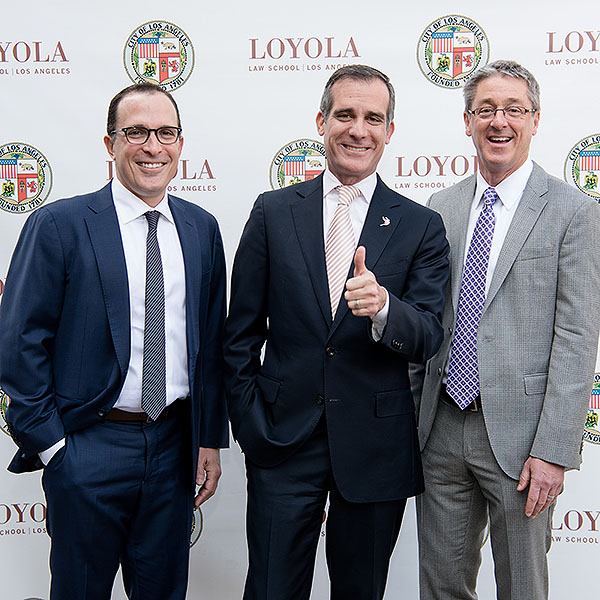L.A. Mayor Garcetti, LMU President Snyder, LLS Dean Waterstone Inaugurate Loyola Social Justice Law Clinic

Loyola Law School, Los Angeles recently celebrated the grand opening of its Loyola Social Justice Law Clinic and the inauguration of the Collateral Consequences of Conviction Justice Project, also known as the CCCJP, a partnership with Los Angeles Mayor Eric Garcetti’s Office of Reentry, during a ceremony on Loyola’s downtown campus.
Mayor Garcetti, LMU President Timothy Law Snyder and Dean Michael Waterstone gathered in front of a standing-room only crowd to inaugurate the new clinic space and talk about the importance of the CCCJP, a legal clinic that helps clients move on with their lives after incarceration.
“People should be met with forgiving hearts, open doors, and real opportunities when trying to rebuild their lives,” said Mayor Garcetti. “Helping men and women get the housing, employment and education they need after incarceration is not just the right thing to do for them and their families — it’s absolutely critical to keeping our communities safe.”
About one in four adults in California has an arrest or conviction record, which creates significant barriers to employment. According to the National Institute of Corrections, up to 89 percent of ex-offenders who are re-arrested are unemployed. In California, the average recidivism rate is 65 percent — but it drops to as low as 3% for individuals who secure jobs shortly after release. Mayor Garcetti has put a special focus on creating new opportunities for underserved populations in Los Angeles, including Angelenos who have served time in jail or prison and need help getting a new start, which dovetails with Loyola’s own mission.
“At its core, the Collateral Consequences of Conviction Justice Project is about people. It is about caring for one another,” said Timothy Law Snyder, President of Loyola Marymount University. “This project enkindles positive change at the individual level in a way that impacts each of us, as well as our great City of Angels. Indeed, helping people find purpose and opportunity and a second chance, is essential to each and every one of us.”
Under the supervision of an attorney, the CCCJP is staffed by Loyola student advocates who represent clients needing legal assistance in such areas as employment, immigration, child support and professional licensing. The CCCJP already has handled more than 220 matters and is supported by the Mayor’s Fund for Los Angeles and the California Community Foundation. Tom Rothman, Chairman of Sony Pictures, has committed to underwriting the clinic after the first year of funding is exhausted.
The Loyola Social Justice Law Clinic itself is an impressive new aggregation of Loyola’s criminal defense, immigration, post-conviction relief and other clinics focused on important community issues under one roof. Thanks to a dramatic renovation of nearly 23,000 square feet of Loyola’s Founders Hall, the new LSJLC houses together for the first time multiple Law School clinics: the CCCJP, International Human Rights Clinic, Loyola Immigrant Justice Clinic, Juvenile Innocence and Fair Sentencing Clinic, Juvenile Justice Clinic and Youth Justice Education Clinic, to name just a few.
“There is an access-to-justice crisis in this country. This is a society-wide problem, and law schools have a crucial role to play. One of the primary ways we do this is through clinical legal education. Our clinic students work under the supervision of our faculty to represent a variety of people in our community with important, unmet legal needs,” said Michael Waterstone, Fritz B. Burns Dean, Loyola Law School. “The Loyola clinical model is exciting because it brings clinics together under one roof on our campus, forming our own social justice law firm.”
Mimicking the approach of a law firm with several specialties, the Center will provide students with a more realistic look at the life of a law practice. The move allows Loyola’s clinics to better support their clients through efficiencies in shared services. Clinics now share support staff, case-management software and amenities like conference rooms and a client waiting area.
Loyola’s mission has always focused on serving the underserved,” said Cindy Archer, Associate Dean for Clinical Programs & Experiential Learning. “Our new Social Justice Law Center and expanded offerings give our students even more ways to gain practical experience while giving back to the community.”
Added Waterstone, “For the first time, many of our live-client clinics will be housed under one roof, operating collaboratively as a social-justice law firm to help the greater Los Angeles community. It is an exciting moment, and one that stands ready to produce graduates with training and passion to help close the justice gap.”
Loyola has long been committed to social justice, with more than 1 million pro bono hours donated to 50,000-plus clients since the school’s 1920 founding. The first ABA-accredited school in California to institute a pro bono requirement for graduation, Loyola’s students annually donate about 60,000 of pro bono services.
Angelenos interested in the free legal services offered by CCCJP can learn more at www.lls.edu/CCCJP. Those interested in learning more about the LSJLC and the many clinics and services offered to the community can read more here.